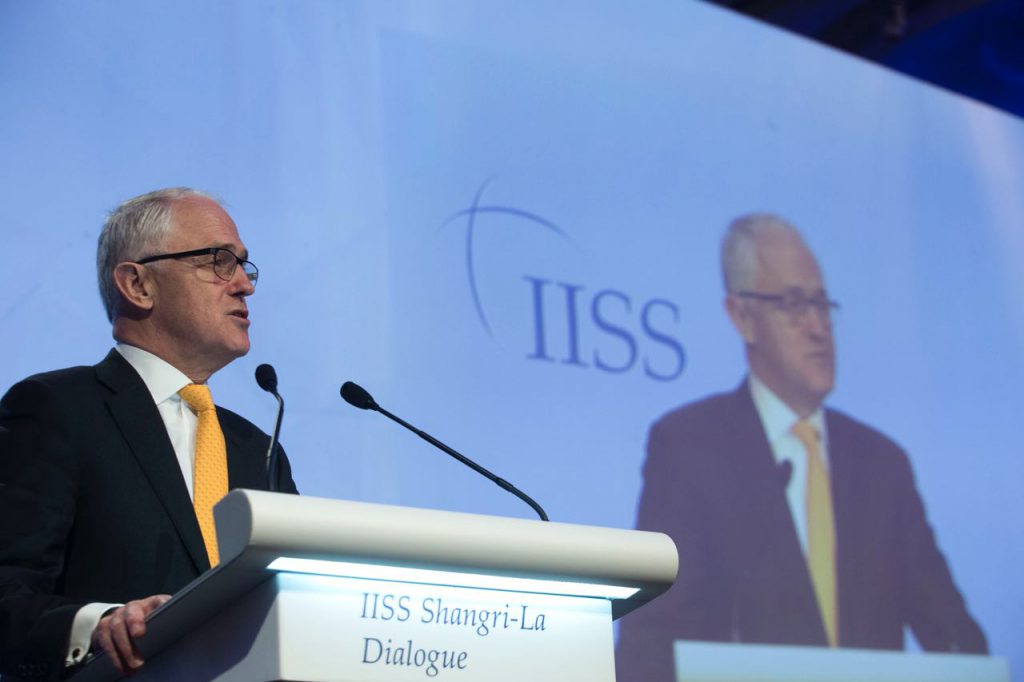
The spotlight is once again on Australia and whether it will conduct freedom of navigation operations (FONOPS) in the South China Sea. The debate has been revived as a result of remarks made by the recently retired long-standing Australian government bureaucrat
Dennis Richardson, and by the visiting US Senator
John McCain, followed by Malcolm Turnbull’s
robust speech at the IISS Shangri-La Dialogue in Singapore on 2 June.
South China Sea FONOPS was also highlighted in late May after the USS
Dewey conducted a manoeuvring drill in the waters adjacent to Mischief Reef in the South China Sea. Mischief Reef is a coral reef in the centre of the Spratly Islands that has been claimed and occupied by China and been subject to considerable expansion through China’s artificial-island-building activities. The
Dewey practised a man-overboard scenario consistent with its freedom of navigation. The exercise was typical of US FONOPS in waters that aren’t considered to be a part of the territorial sea of the nearby country, and sends a clear signal that the US doesn’t respect any claims China may make to territorial sea or any other form of maritime entitlement in and around Mischief Reef.
The US has been conducting FONOPS in oceans and seas around the world since 1979. They have had two primary purposes. The first is to protect the mobility of US forces and to ensure that they can move freely between oceans, which has been critical for the maintenance of US naval hegemony. The second is to make clear that navigational rights and freedoms can be enjoyed by all countries consistently with the law of the sea. Importantly, in its very first decision in 1949, the International Court of Justice affirmed that the right of innocent passage applied in the territorial sea to all ships, including warships. The US’s conduct of FONOPS in the South China Sea sends an important signal to China that those navigational rights cannot be easily interfered with.
The situation in the South China Sea is made more complex because of the contested claims to the islands, rocks and adjacent maritime areas. In 2016, a UN arbitral tribunal handed down a ruling in favour of the Philippines that dismissed China’s ‘nine-dash line’ maritime claim to much of the South China Sea and held that much of the disputed seas fell within the Philippines’ 200-nautical-mile exclusive economic zone. While the tribunal didn’t make any rulings on the territorial disputes over the islands and rocks scattered throughout the region, it did conclude that none of those features generated a maritime zone in excess of a 12-nautical-mile territorial sea. The tribunal unanimously ruled that Mischief Reef wasn’t an island and didn’t generate any maritime entitlements such as a territorial sea, and that it was therefore a feature lying within the Philippines’ exclusive economic zone. China has consistently rejected the validity of the tribunal and didn’t participate in any of the proceedings. It has flatly dismissed the 2016 award, which it considers to be non-binding.
The recent actions of the USS
Dewey only seek to reaffirm the tribunal’s ruling that Mischief Reef doesn’t generate a territorial sea or any other maritime entitlement and that US warships are perfectly entitled to conduct naval exercises in the waters adjacent to the reef. China has responded to the US with
‘stern representations’, which again is consistent with the Chinese position that it has a legitimate claim to Mischief Reef, and that it can claim an adjacent territorial sea.
Australia now has an opportunity to take a firm stand and back up the US. Australia has been a strong supporter of the international law of the sea and was an active player in the negotiation of the 1982 UN Convention on the Law of the Sea. Both Australia and China are parties to the convention, along with 164 others, and respect for the law of the sea and freedom of navigation are fundamental to Australia’s trade prosperity. While Australia has also reminded China of the importance of honouring the rule of law and the 2016 award, those words need to be backed by actions—which, in the case of any potential Australian FONOPS in the South China Sea, would be entirely consistent with international law.
China’s position on freedom of navigation by foreign warships remains a minority view that Australia should be actively challenging, lest it become the de facto legal position. Given the current regional security concerns throughout Southeast and East Asia, Australia wouldn’t wish to be constrained in its naval movements in coming to the aid of regional friends and allies because of China’s position on warship navigation through the South China Sea. Australia has a national interest in seeking to resolve any ambiguity about the freedom of navigation of its warships, and joining the US in FONOPS would stake out a clear and firm Australian position.
 Print This Post
Print This Post